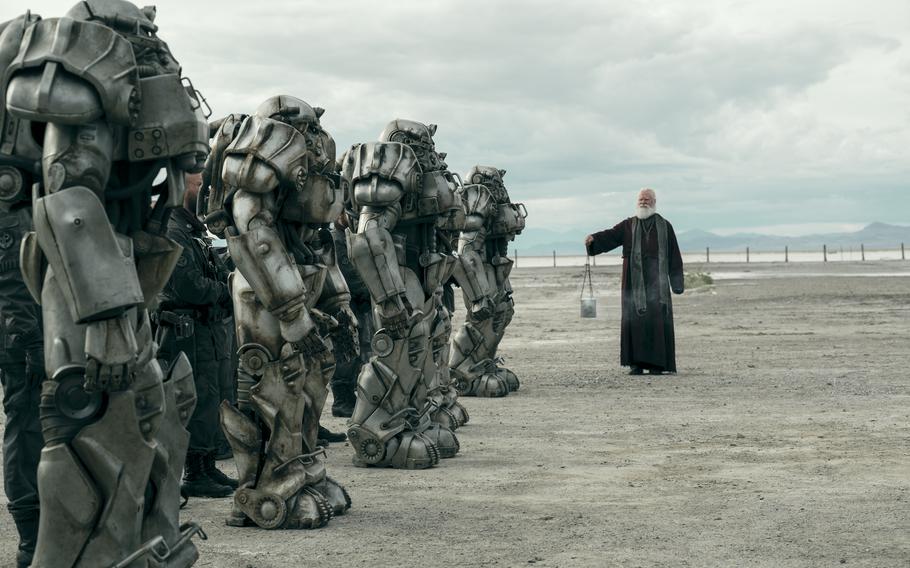
Amazon’s recent “Fallout” series, based on the post-apocalyptic games, has reached 65 million viewers. (Prime Video)
When she first saw the email, Nadia Thorne thought it was a prank, or maybe a student project. A Hollywood production company wanted to turn her video game into a movie?
Thorne was one of the four people behind Dredge, an independently produced game that blends serene fishing with cosmic horror. Although Dredge received rave reviews when it came out in March 2023, it wasn’t the type of high-profile property that might typically draw audiences to cinemas.
But the requests kept coming, not from clueless amateurs but from the companies behind blockbusters like “Harry Potter” and “Star Trek.” A few months later, Thorne and her team struck a deal with Story Kitchen, founded by the producers of “Sonic the Hedgehog,” to make a feature film based on Dredge.
“They seem to think it’s going to go ahead,” Thorne said. “Apparently all the major studios are excited.”
Moviegoers have begun to tire of superheroes after a deluge of comic book films. Walt Disney Co. Chief Executive Officer Bob Iger said in mid-May that the company would cut the number of Marvel films and TV show it releases a year in half, to about two of each. Hollywood, meanwhile, is looking to the video game industry as the next fertile ground for story ideas. Spurred by hits such as "The Super Mario Bros. Movie," dozens of video game franchises have been optioned or produced for film and television over the past two years, from God of War to Grounded.
Many of these adaptations are still in development, but the ones released have found success. Amazon.com Inc.’s recent "Fallout" series, based on the post-apocalyptic games, has reached 65 million viewers, while the first two "Sonic the Hedgehog" films have grossed more than $700 million, with a third entry slated for later this year. It’s a two-way street: Sarah Bond, president of Microsoft Corp.’s Xbox division, said at the Bloomberg Technology Summit on May 9 that the "Fallout" TV show is leading viewers to engage with the games.
Hungry producers have gobbled up the options to both mega-franchises and hit indie games, such as Dredge and the detective role-playing game Disco Elysium. Even games with little to no name recognition have tantalized Hollywood, such as the ancient Sega action series Golden Axe and El Paso, Elsewhere, a low-budget shooter that has been optioned by the actor LaKeith Stanfield.
David A. Gross, author of the FranchiseRe movie newsletter, said that even lesser-known video games are appealing to film and television producers because they have a narrative already established.
“Hollywood looks for new stories wherever they can be found,” Gross said. “Those games might not have as much (intellectual property) asset value, but they still have potential.”
Video game adaptations were once a laughingstock thanks to campy 1990s films based on Super Mario Bros., Double Dragon and Street Fighter. More recent movies such as 2010’s "Prince of Persia: The Sands of Time" and 2016’s "Warcraft" were commercially successful, largely due to overseas markets, but critically panned. Jake Gyllenhaal, who starred in "Prince of Persia," later expressed regret about the experience.
But the curse has been broken in recent years thanks to critical darlings such as Netflix Inc.’s "The Witcher," based on a series of Polish novels and video games, which recently began filming a fourth season. Last year, HBO’s "The Last of Us" became the first video game adaptation to rack up awards, receiving 24 Emmy nominations and winning eight.
“For many years, there was a belief – supported by poor results – that video games could not be successfully transformed into audience satisfying and profitable films,” said Adam Fogelson, chair of the film studio at Lionsgate Entertainment Corp., which will release a movie based on the video game series Borderlands this August.
Recent hits, Fogelson said, “proved that with the right creative, a new generation was more than ready to embrace those characters and worlds in feature films.”
Prestige television in particular is fertile ground for video game adaptations because it allows for the type of side quests and exploration that make games appealing. While it might have been disastrous to cram the 15-hour story of "The Last of Us" into a two-hour feature film, HBO’s nine-hour series gave it room to breathe — and allowed for diversions like "Long, Long Time," an episode that wasn’t closely related to the overall story but was critically acclaimed.
The historic failure of video game adaptations may have been largely due to a lack of respect for the source material, which has changed in recent years as filmmaking attracted new generations of people who grew up playing games rather than scoffing at them.
Todd Howard, director of multiple Fallout games and an executive producer on the television series, said in a recent interview that the show’s production team was so “meticulous about translating every little thing” that the set designers even used 3D printers to reproduce art from the games.
That appreciation was one of the biggest considerations for Thorne and her colleagues as they weighed multiple offers for turning Dredge into a film or television series. They found themselves impressed with Story Kitchen when one of its producers identified themes they had explored early in the development of Dredge."
“We’re going to be handing off our world, our story,” Thorne said, adding she hoped they were partnering with a studio “that really gets it.”